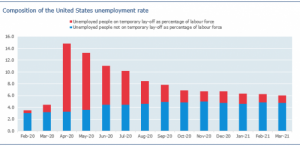Finance & Economics
Post-COVID-19, building resilience to crises and regaining citizen’s trust should be a priority for governments, says OECD
The COVID-19 crisis has demonstrated governments’ ability to respond to a major global crisis with extraordinary flexibility, innovation and determination. However, emerging evidence suggests that much more could have been done in advance to bolster resilience and many actions may have undermined trust and transparency between governments and their citizens, according to a new OECD report.
- Read more
- 417 reads
Unemployment Rates, OECD - Updated: April 2021

The measures put in place by national governments to reduce the spread of the Coronavirus (Covid-19) may have impacted on the ability to field surveys, and so, in turn, on the quality of statistics typically produced. In addition, because of differences in national practices used to determine whether individuals are unemployed when under confinement, international comparability has also been affected
- Read more
- 488 reads
Pakistan’s Economy Shows Signs of a Nascent Recovery
Notwithstanding, the recent rise in COVID cases, Pakistan has been showing signs of a fragile economic recovery with a gradual resumption of economic dynamism, according to a new World Bank report.
- Read more
- 457 reads
IMF Executive Board Approves US$270.83 Million Disbursement to Namibia to address the COVID-19 Pandemic
The Executive Board of the International Monetary Fund (IMF) approved an outright purchase of SDR 191.1 million (about US$270.83 million) to Namibia under the Rapid Financing Instrument (RFI), on March 31. This will help the country address urgent balance of payments and fiscal financing needs stemming from the negative impact of the COVID-19 pandemic. IMF financing will also contribute to catalyzing additional financing from development partners.
- Read more
- 450 reads
Improving Transport Connectivity in Central Asia Requires a Coherent Approach
The combination of infrastructure and logistics improvements, reduction in border delays and tariffs, and harmonized standards across countries could have a significant positive impact on Central Asian economies, said experts during an online regional briefing “Connectivity in Central Asia: Challenges and Opportunities” hosted by the World Bank.
- Read more
- 407 reads
Share on Twitter Share via Email Print this page Africa Suez Canal Backup Could Clear in About 4 Days
Officials said Tuesday the backlog of ships trying to pass through the Suez Canal could take about four days to work through, following nearly a week in which the vital waterway was blocked by a massive container ship.
- Read more
- 426 reads
Recovery Offers Chance to Build Back Better in Latin America and the Caribbean
Latin America and the Caribbean (LAC) suffered more health and economic damage from the COVID 19 pandemic than any other region, although there is potential for significant transformation in key sectors as the region begins to rebound, according to a new World Bank Report.
- Read more
- 428 reads
New World Bank Financing Supports Ethiopia’s Goal of Universal Electricity Access by 2025
The World Bank on March 29, approved a $500 million International Development Association (IDA) credit to support Ethiopia’s goal of achieving universal electricity access by 2025.
- Read more
- 449 reads
Austria: EIB Group cooperates with Raiffeisen-Leasing Group to support SMEs and Mid-Caps in response to the Covid-19 pandemic
*EIB Group to provide EUR 200m of funding to Raiffeisen- Leasing Group through a EUR 538m securitisation transaction
*EIB group’s investment expects to mobilise total fresh investment of up to EUR 560m by Raiffeisen-Leasing
*Transaction is aimed at immediate Covid-19 response with strong focus on climate action
- Read more
- 424 reads
Sudan Clears Arrears, Gains Access to $2 Billion in New World Bank Financing
The Republic of Sudan has cleared its arrears to the International Development Association (IDA), enabling its full re-engagement with the World Bank Group after nearly three decades, and paving the way for the country to access nearly $2 billion in IDA grants for poverty reduction and sustainable economic recovery. By clearing its arrears, Sudan has also completed a key step for receiving comprehensive external debt relief under the Heavily Indebted Poor Country (HIPC) Initiative.
- Read more
- 430 reads
Human Rights
Fostering a More Humane World: The 28th Eurasian Economic Summi

Conscience, Hope, and Action: Keys to Global Peace and Sustainability

Ringing FOWPAL’s Peace Bell for the World:Nobel Peace Prize Laureates’ Visions and Actions

Protecting the World’s Cultural Diversity for a Sustainable Future

Puppet Show I International Friendship Day 2020

